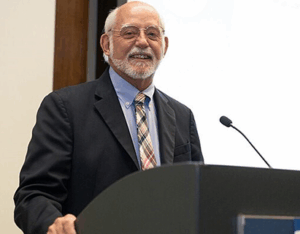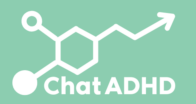This article
- Summarizes key points from a youtube lecture given by Dr Russell Barkley on ADHD Coaching.
- Brings in my perspective as an ADHD coach and psychoeducator. (Indicated by Yes! AND below)
Russell A. Barkley, Ph.D. is a clinical neuropsychologist and an internationally recognized authority on attention deficit hyperactivity disorder (ADHD/ADD) in children & adults who has dedicated his career to widely disseminating science-based information about ADHD.

In lecture #4 about low-tech solutions for ADHD Issues, he discusses the nature of ADHD Coaching, issues to be aware of in this approach to personal assistance, and websites that provide further information on the topic or can help you find a Coach. See the full video here.
Part 1 Things to know about ADHD Coaching
ADHD Coaching is a targeted supportive service involving collaboration with clients to promote the use of practical adaptive skills in daily life (planning, time management, etc).
It often uses skills and knowledge from Cognitive Behavioral Therapy (CBT) — aka much of it is evidence-based.
Coaching is intended to complement and be an adjunct to ADHD medications and[/or] evidence based psychological services (ie. CBT).
Yes ! AND
Many coaches bring additional perspectives to their practice, such as
- Intersectionality
- Peer support from lived experience
Intersectionality
As a social anthropologist, I look at each individual’s unique ADHD experience within their personal context.
We explore questions of identity and experience in relation to culture, social norms, identity, gender, sexual orientation, medical history, and value sets.
Intersectionality Theory, first coined by Kimberlé Crenshaw in 1989, is a framework used to understand how various forms of inequality, discrimination, and social identities (such as race, gender, class, sexuality, and disability) intersect and overlap.
It emphasizes that people are not defined by a single social category but by multiple interconnected aspects of their identity that can result in unique experiences of privilege or oppression.
Peer support
As someone diagnosed with ADHD as an adult, my own continuous journey of struggles and strengths informs my understanding of ADHD and the impact it brings to daily life.
I help individuals find their balance between self-acceptance, self-improvement, and self-compassion.
Since there is no one-size-fits all mold for neurodivergent experiences, I invite each person to share and define their stories as they see them.
Part 2 What you need to know about coaches
ADHD coaches are not required to have a professional degree or training in any of the mental health professions as of Jan 2025.
Coaches are not licensed like psychiatrists, psychologists, etc (no min standard).
They are not usually trained in psychological therapies or ADHD medications – the focus is more on daily life and supporting wellness, not with emotional issues (eg trauma), psychiatric disorders or comorbidities, etc.
Yes ! AND
I am a certified coach specialized in ADHD support. The curriculum was created by ADHD psychological experts in Switzerland to scale up ADHD support. I’m also a prison expert on social inequalities and have over 5 years of experience as a prison visitor, accompanying people in prison. (More on this in an upcoming post!)
I have a Bachelor’s in Psychology, I have assisted and conducted psychological research, I adopt a trauma-informed approach, and I continuously follow trainings and conferences on mental health. My coursework included Trauma and Resilience, Drugs and Behavior, Humanistic Psychology, Grief Counseling, Multicultural Counselling, Theories of Personality, etc. My Master’s in Anthropology and Sociology grants me the ability to shift perspectives and points of view to draw connections and think outside the box.
With this training, I am able to accurately describe psychological therapies, ADHD medications, and comorbidities (co-occurring conditions) for psychoeducational purposes. I also work with clients to develop eventual questions to pose to their medical professionals for follow up.
Part 3 Focus on ADHD coaching
Coaching can occur in many settings (home, work, community, phone, text, virtual, by internet via email, social media, etc)
Coaches generally target the following main areas of executive functioning and life skills to help adults with ADHD adapt to their disorder and promote positive outcomes
-
- Maintaining attention and activation at work
- Organization and time management
- Managing emotions
- Increasing and maintaining motivation
- Incorporating regular exercise and movement during sedentary work or activities
- Some focus on wellness issues like diet and nutrition, lifestyle changes, mindfulness, etc
- Supporting client ability to carry out self-determined goals and actions
- Managing substance use (as needed)
Dr Barkley recommends that a Coach periodically consult with other treating mental health professionals about client problems and treatment status (psychiatrists, psychologists, clinical social workers, etc).
Yes ! AND
I offer the following services across contexts:
- Individual coaching (online, in person, on walks, etc)
- Group workshops (stand alone, for teams, for mental health professionals, reading groups, etc)
- Public speaking (advocacy and awareness raising in workplaces, universities, schools, conferences, etc).
- Workplace Policy Development (coming up with practices and accommodations that match each organizations’ resources)
- Organization and Decluttering (for the home, the workplace, the computer, etc)
I also target the main areas listed above as well as :
- procrastination
- goal setting
- emotional regulation
- impulsivity
- motivation
- self-compassion
- self-esteem
- focus
- perfectionism and cognitive distortions
- limiting distractions
- building routines (exercise, sleep, etc)
- decision making
- identity
- social anxiety
- substance use
- entrepreneurship
In addition to consulting with mental health professionals, I often partner with experts in complimentary fields such as
- nutrition,
- physical therapy,
- autism,
- research,
- LGBTQI+,
- discrimination,
- project management,
- improv theatre,
- and more !
Part 4 Even more things to know
There is a small but growing body of research on Coaching showing that it likely has positive benefits for most clients (most research is on college students and adults).
Coaching is often done on individual basis but can be done in groups.
It’s a collaboration so find the right match for you.
Beware of issues that can complicate success of Coaching:
-
- Comorbid disorders and need for polypharmacy
- Substance use and abuse
- Antisocial tendencies
- Serious medical problems
- Unusually stressful life circumstances (marital problems, divorce, death of a family member, chronic unemployment, financial hardship)
Yes ! AND
Don’t be afraid to tell me if something is or isn’t working! Question everything, I can take it 🙂
Coaching requires effort from your part, so be ready to put some work in. AND if you come in needing a break, to vent, or a body doubling session without talking, I’m here for it. Collaboration is key and not everything is a quick fix.
Regarding the issues above that can interfere with the coaching process, please let me know if any of these apply to you. Many of my clients fit in to one or several of these boxes, and we work together to find strategies that take these issues into account. In some cases, that includes bringing in other professionals into the team and sometimes that means referring you to others for more adapted support.
“The beauty of coaching is that these individuals can be a frequent part of your weekly activities. And that’s what I love about coaching. It’s more than weekly therapy for instance of a monthly meeting with your psychiatrist about your medication. Coaches can actually hold you socially accountable for the goals that you’re setting and can also help with you suggestions with regard to your executive functioning deficit. So I think that’s the beauty of coaching as one piece in an overall treatment package for adults with ADHD. It really fills that need for helping people follow through with their goals as well as with some behavior change programs.”
— Dr Russell Barkley
